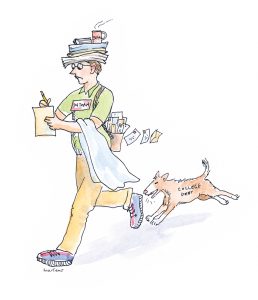
Wordplay
August brings some entertaining reads about writing,
language and believe it or not, punctuation
Compiled by Brian Lampkin
While it might seem obvious to say, the simple fact is often overlooked: Poems are made up of words, syllables, symbols. The raw material of high-minded, emotionally charged, life-changing poetry is the humble letter and its disrespected companion punctuation. Below you’ll find a compendium of recently published or soon-to-be published books on words, language and letters. Some of them are more useful — and more readable — than your average book of poems.
Take this gem of prose style: Dreyer’s English: An Utterly Correct Guide to Clarity and Style, by Benjamin Dreyer (Random House, $25. 2019). Dreyer, among other things, is the copy chief at Random House and has been the editor for books by Michael Chabon, Shirley Jackson, Michael Pollan, Elizabeth Strout and dozens more of our favorite writers. Much funnier than most poems, Dreyer’s English gives example after example of how to use language and how to avoid misuses of language. But really the entire book is an example of effective, engaging prose style.
Mary Norris continues her love affair with the roots of language with Greek to Me: Adventures of the Comma Queen (W.W. Norton, $25.95. 2019). Greek to Me is a charming account of Norris’ solo adventures in the land of olive trees and ouzo. Along the way, Norris explains how the alphabet originated in Greece, makes the case for Athena as a feminist icon, goes searching for the fabled Baths of Aphrodite and reveals the surprising ways Greek helped form English. Filled with Norris’ memorable encounters with Greek words, Greek gods, Greek wine — and more than a few Greek men — Greek to Me is the Comma Queen’s fresh take on Greece and the exotic yet strangely familiar language that so deeply influences our own.
Coming soon:
August 6: In Other Words: An Illustrated Miscellany of the World’s Most Intriguing Words and Phrases, by Christopher Moore (Bloomsbury, $18). Ever racked your brain for a word you’re convinced should exist, yet is inexplicably absent from the dictionary? All languages have their limitations — should English fall short, the expression may lie elsewhere. That’s where this book comes in: a quirky, international lexicon of linguistic gems that captures (lexicon is the subject, right?) cultural untranslatables with satisfying precision.
August 13: And How Are You, Dr. Sacks?: A Biographical Memoir of Oliver Sacks, by Lawrence Weschler (FSG, $28). Whatever else neurologist Oliver Sacks was addressing, language and communication were at the center of his concern. Weschler sets Sacks’ brilliant table talk and extravagant personality in vivid relief, casting himself as a beanpole Sancho to Sacks’ capacious Quixote. We see Sacks rowing and ranting and caring deeply; composing the essays that would form The Man Who Mistook His Wife for a Hat; recalling his turbulent drug-fueled younger days; helping his patients and exhausting his friends; and waging intellectual war against a medical and scientific establishment that failed to address his greatest concern: the spontaneous specificity of the individual human soul. And all the while he is pouring out a stream of glorious, ribald, hilarious and often profound conversation that establishes him as one of the great talkers of the age. Here is the definitive portrait of Sacks as our preeminent romantic scientist, a self-described “clinical ontologist” whose entire practice revolved around the single fundamental question he effectively asked each of his patients: How are you? Which is to say, How do you be?
August 13: First You Write a Sentence: The Elements of Reading, Writing . . . and Life, by Joe Moran (Penguin, $17). The sentence is the common ground where every writer walks. A good sentence can be written (and read) by anyone if we simply give it the gift of our time, and it is as close as most of us will get to making something truly beautiful. Using minimal technical terms and sources ranging from the Bible and Shakespeare to George Orwell and Maggie Nelson, as well as scientific studies of what can best fire the reader’s mind, author Joe Moran shows how we can all write in a way that is clear, compelling and alive.
August 13: Have You Eaten Grandma?: Or, the Life-Saving Importance of Correct Punctuation, Grammar, and Good English, by Gyles Brandreth (Atria, $26). In this brilliantly funny and accessible guide to proper punctuation and so much more, Gyles Brandreth explores the linguistic horrors of our times, tells us what we’ve been doing wrong and shows us how, in the future, we can get it right every time. Covering everything from dangling participles to transitive verbs, from age-old conundrums like “lay” vs. “lie,” to the confounding influences of social media on our everyday language, Have You Eaten Grandma? is an endlessly useful and entertaining resource for all. OH
Brian Lampkin is one of the proprietors of Scuppernong Books.





